Black Cohosh
Black Cohosh (Actaea Racemosa) is a flowering Phytoestrogenic plant which grows in the woods of eastern North America. Black Cohosh is one of the most popular herbs for menopause used in treatments for alleviating menopause symptoms due to its effectiveness in controlling hot flashes, depression and night sweats.
What is Black Cohosh?
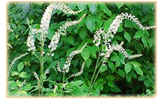 Black cohosh is a widely available supplement that is used all over the world to treat a range of illnesses and conditions. Although little medical information is available about this plant and its supplements, many people experience real benefits in their day to day life by taking black cohosh. Black cohosh is a widely available supplement that is used all over the world to treat a range of illnesses and conditions. Although little medical information is available about this plant and its supplements, many people experience real benefits in their day to day life by taking black cohosh.
Origins of Black Cohosh
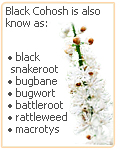 Black cohosh is a flowering, phytoestrogenic plant that grows in the woods of eastern North America. The word cohosh means "knobby rough roots" and it derives from Native American tribes who used this plant as medicine for centuries. Black cohosh is a flowering, phytoestrogenic plant that grows in the woods of eastern North America. The word cohosh means "knobby rough roots" and it derives from Native American tribes who used this plant as medicine for centuries.
Different Names for Black Cohosh
Its Latin name is Actaea Racemosa, but black cohosh is also known as: black snakeroot, bugbane, bugwort, rattleroot, rattletop, rattleweed, and macrotys.
Pharmacology and Chemical Composition
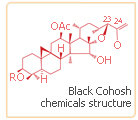 Acetein (which has antihypertensive effects) and ferulic/isoferulic acids (anti-inflammatory effects) are part of the chemical make-up of the black cohosh plant. This offers some explanation as to its effectiveness in treating menstrual problems and conditions such as rheumatism, which are often exasperated by inflammation. Acetein (which has antihypertensive effects) and ferulic/isoferulic acids (anti-inflammatory effects) are part of the chemical make-up of the black cohosh plant. This offers some explanation as to its effectiveness in treating menstrual problems and conditions such as rheumatism, which are often exasperated by inflammation.
Although research into the chemical composition of black cohosh is lacking and largely ambiguous, until recently it was thought to be a phytoestrogenic herb. This means that black cohosh was thought to produce its own type of plant hormone, cimicifugin (macrotin), which has similar properties to estrogen in humans. Yet, modern day research suggests that this type of composition is incorrect.
How Does Black Cohosh Grow?
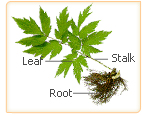 Growing up to eight feet tall, the black cohosh plant bears dark blue berries during fall and long stems of white flowers during the spring. Growing up to eight feet tall, the black cohosh plant bears dark blue berries during fall and long stems of white flowers during the spring.
What Does Black Cohosh Look Like?
As well as its flowers and berries, black cohosh can be identified by its jagged green leaves and, if removed from the soil, its large knobby roots.
Click the link provided to keep reading about what is black cohosh. It is important to remember that Black Cohosh is sometimes mistaken for Blue Cohosh but they are two different herbs entirely. Read the following section to find out all about Blue Cohosh.
Blue Cohosh
Blue cohosh is one of a diverse range of supplements available in today’s market but is very different from its namesake, black cohosh. The toxic nature of blue cohosh makes it more dangerous to consume and it’s important to know more about it before including this herb in the diet.
Difference between Blue and Black Cohosh
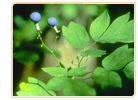 Blue cohosh, although similar in name to black cohosh, is actually another species of plant altogether. This herb can be identified by its bluish-green leaves and blue fruits and it only grows to around three feet tall. Blue cohosh, although similar in name to black cohosh, is actually another species of plant altogether. This herb can be identified by its bluish-green leaves and blue fruits and it only grows to around three feet tall.
Common Uses of Blue Cohosh
In the past, blue cohosh was used most commonly for inducing labor, and relieving menstrual irregularities and problems.
Safety and Side Effects of Blue Cohosh
A substance in the blue cohosh root has been identified as having a similar composition to nicotine, so much so that it is potentially toxic and could be dangerous when consumed regularly. High blood pressure may become more serious with blue cohosh consumption, as will any existing intestinal and stomach problems. If blue cohosh is taken by a pregnant woman, miscarriage or false labor pains may result and for these reasons, it is best to consult a doctor before taking blue cohosh.
Click on the following link to learn more about blue cohosh. Now that the differences between Black Cohosh and Blue Cohosh have been clarified. Read the next section to learn about the way in which black cohosh works.
How Does Black Cohosh Work
Black cohosh can affect the human body in a number of ways, and as well as positive effects there are also negative and potentially harmful effects which must be considered.
Black Cohosh Properties
Black cohosh also contains diaphoretic, antipyretic, antifungal, and antibacterial compounds which means it can effectively treat menstrual and rheumatism problems, which are often aggravated by inflammation and infection.
How Black Cohosh Works on the Body
 It was previously believed that black cohosh possessed estrogen-like chemicals which acted as a substitute for the body�s own estrogen levels. Taking black cohosh would therefore help steady estrogen levels in they body as well as treat medical conditions caused by estrogen deficiency or instability. Such conditions include menstrual and menopausal irregularities. It was previously believed that black cohosh possessed estrogen-like chemicals which acted as a substitute for the body�s own estrogen levels. Taking black cohosh would therefore help steady estrogen levels in they body as well as treat medical conditions caused by estrogen deficiency or instability. Such conditions include menstrual and menopausal irregularities.
Recent research into black cohosh as a treatment for menopause symptoms has shown that it does not contain estrogen-like chemicals, meaning scientists still don�t understand exactly how black cohosh works on the body.
Click on the following link to learn more about how black cohosh works, or continue reading below to learn about the way in which black cohosh can be used.
Uses of Black Cohosh
 In the past, black cohosh was used in a variety of ways but today it is more commonly used to boost women's health, for example, to correct hormone irregularities. Stomach problems, headaches, and female reproductive problems were all treated with black cohosh by Native American tribes. Reproductive problems often included menstrual irregularities, infertility, and menopause. In the past, black cohosh was used in a variety of ways but today it is more commonly used to boost women's health, for example, to correct hormone irregularities. Stomach problems, headaches, and female reproductive problems were all treated with black cohosh by Native American tribes. Reproductive problems often included menstrual irregularities, infertility, and menopause.
Black Cohosh and Other Herbs: Combining blue and black cohosh to induce labor was a common medical practice in the past.
Modern Uses of Black Cohosh: Today black cohosh is used to treat the following problems:
 • Infertility • Infertility
• Menstrual Irregularities
• Menopause Symptoms, such as:
- Mood swings
- Hot Flashes
- Night sweats
- Depression
- Sleep disturbances.
Different Black Cohosh Products
Usually created from the root of the black cohosh plant, there are a host of herbal products, including black cohosh tablets, black cohosh pills and black cohosh extract in its natural form, which can be made into black cohosh tea.
Dosage of Black Cohosh
In tablet form, the recommended black cohosh dosage is 40 milligrams per day in pills that have the equivalent of 20 mg of root per tablet.
Safety about Black Cohosh Use
As black cohosh has not been thoroughly tested, its usage is recommended by the American College of Obstetricians and Gynecologists only in the short-term (six months or less).
Black Cohosh Overdose
If a person ingests a large amount of black cohosh at any one time or starts to feel unwell after taking the supplement, it is important to seek medical attention immediately.
Click on the following link to read more about the uses of black cohosh, or continue reading below to learn about the benefits of black cohosh.
Black Cohosh Benefits
 Black cohosh has been used for centuries and it is known to be effective in treating various ailments. Black cohosh can reduce weight gained as a result of hormone-related changes in the body, such as menopause. By aiding weight loss, black cohosh helps to reduce the risk of weight-related illnesses including heart disease, stroke, breast cancer, high blood pressure, high cholesterol, and diabetes. Black cohosh has been used for centuries and it is known to be effective in treating various ailments. Black cohosh can reduce weight gained as a result of hormone-related changes in the body, such as menopause. By aiding weight loss, black cohosh helps to reduce the risk of weight-related illnesses including heart disease, stroke, breast cancer, high blood pressure, high cholesterol, and diabetes.
As this herb also contains some anti-inflammatory compounds, it may also help relieve aching joints and pains.
Specific Benefits Relates to Some Ailments
It is well-known that black cohosh benefits the female reproductive system and can be used to treat the menopausal symptoms of hot flashes, mood swings, depression, and irregular sleeping patterns. As a result, many women benefit from black cohosh in terms of sleeping better, experiencing relief from night sweats and worries, having more energy and regaining control of their lives.
Click on the following link to read more about the benefits of black cohosh, or continue reading below to learn the side effects of taking black cohosh.
Black Cohosh Side Effects
Although there are many positive reasons to take black cohosh, not least its ability to improve the quality of life, it also important to be aware of the dangers that even natural supplements can pose.
Black Cohosh Warnings:
There are several warnings about black cohosh and its use. Here is a summary of the most important warnings:
 - Breast Cancer Risk. Research has shown that the growth of breast cancer cells, in particular, can be accelerated by black cohosh. - Breast Cancer Risk. Research has shown that the growth of breast cancer cells, in particular, can be accelerated by black cohosh.
- Large Doses. Dizziness, headaches, and nausea can occur when too much black cohosh is ingested at any one time. Consult a doctor if this occurs.
- Aspirin. Research shows that these two components should not be mixed.
Black Cohosh Side Effects:
Black cohosh possesses many good qualities but there are some side effects which cannot be ignored. Some of them are related to:
- Hormonal. Black cohosh can interfere with birth control pills and hormone replacement therapy (HRT). In fact, some patients may find that black cohosh affects this type of medication in such a way that the medication becomes ineffective.
- Pregnancy. Black cohosh was not thought to harm the unborn child but it is extremely important to check with a doctor before taking this supplement during pregnancy.
Black Cohosh Substitutes
 Herbal supplements rarely get the medical attention that man-made therapies receive when it comes to medical testing and establishing whether a substance is safe or not. Thus, black cohosh usage has been sorely neglected by scientists. Only a limited amount of scientific research has been conducted and so substitutes for this supplement may come in the form of non-estrogenic herbs, which are known to be safer. Herbal supplements rarely get the medical attention that man-made therapies receive when it comes to medical testing and establishing whether a substance is safe or not. Thus, black cohosh usage has been sorely neglected by scientists. Only a limited amount of scientific research has been conducted and so substitutes for this supplement may come in the form of non-estrogenic herbs, which are known to be safer.
Click on the following link to read more about black cohosh side effects, or continue reading below to learn about black cohosh as a treatment for menopause symptoms.
Black Cohosh and Menopause
Many women suffer from distressing menopausal symptoms from the ages of 40 to 50, and it's important to know that there are natural alternatives to medically-developed treatments such as HRT.
Black Cohosh for Menopausal Women
 Menopause symptoms are triggered by the imbalance of hormones in a woman's body, notably low estrogen levels. Black Cohosh was commonly thought to help relieve menopause symptoms by replacing natural human estrogens with artificial estrogens (phytoestrogens). Recent research has suggested otherwise, but black cohosh continues to be effective in soothing menopausal symptoms for women worldwide. Menopause symptoms are triggered by the imbalance of hormones in a woman's body, notably low estrogen levels. Black Cohosh was commonly thought to help relieve menopause symptoms by replacing natural human estrogens with artificial estrogens (phytoestrogens). Recent research has suggested otherwise, but black cohosh continues to be effective in soothing menopausal symptoms for women worldwide.
It is important to seek the advice of a medical professional before starting a course of black cohosh during this period. Click on the following link to read more about black cohosh and menopause.
Conclusions about Black Cohosh
Black cohosh is helpful for relieving some menopause symptoms, but this supplement has been criticized because it adds artificial hormones to the body. In so doing, black cohosh can trigger a variety of side effects, including serious conditions like breast cancer.
There are other alternative remedies which are just as effective as black cohosh, but without the side effects. Non-estrogenic herbs, for example, are a great option for alleviating the symptoms of menopause. Read more in the following article.
Which herb should women try? Today women are looking for relief from their menopause symptoms with herbs. Phytoestrogenic herbs and non-estrogenic herbs are good in relieving menopause symptoms, but recent studies show that non-estrogenic herbs have no side effects because they help the body to produce its own hormones instead of introducing hormones like the phytoestrogenic ones. Learn more about non-estrogenic herbs for menopause.
| 

